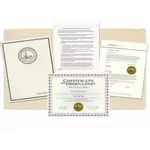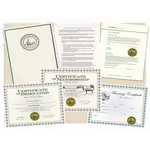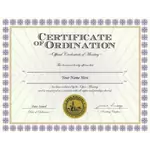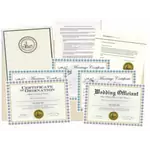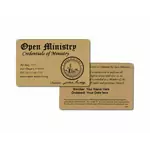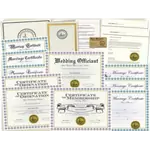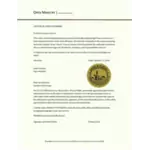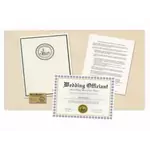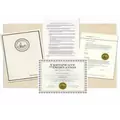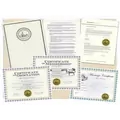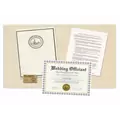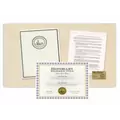Information on How to Get Ordained and Register as a Minister
How to get ordained and perform a wedding or ceremony in Pennsylvania.
Since 2010, Open Ministry has been ordaining and helping people all over the world perform weddings, ceremony and other sacerdotal duties. This page focuses on requirements and information for Pennsylvania, if you don't need the States Statues or ordination information for Pennsylvania scroll down to the bottom of the page for links to other states.
Let's get started with the information for Pennsylvania
If you are planning to get ordained in Pennsylvania or you have been asked to perform a wedding ceremony in Pennsylvania, or simply need to to find a minister in Pennsylvania to perform your wedding ceremony the information on this page will assist you. If you still have questions we invite you to visit our FAQ or contact us for more detailed information. We are here to help and support our ministers and congregation.
Registered Ministers with Open Ministry have successfully performed thousands of marriages in Pennsylvania and around the world!
The Ordination and Officiant information is provided below in an easy five step layout which is designed help walk you through the most common steps on registering to become a minister for Pennsylvania and how perform a wedding ceremony in Pennsylvania.
Step 1 - How to Become Ordained
How to get Ordained in Pennsylvania and become a minister to perform weddings and marriage ceremonies in Pennsylvania
Ordinations for Pennsylvania are completely free and can normally be completed in less than a day. Thousands of people have registered and became licensed ministers in Pennsylvania. Once you have completed the ordination process you are able perform marriages through Open Ministry in and for the state of Pennsylvania!
Become Ordained for free and start your journey as an authorized minister in Pennsylvania with Open Ministry.
Get started today by clicking on the link below!
Step 2 - Contact The County Clerk
How to Register to Officiate a Marriage in Pennsylvania
Next, contact the office of your local marriage authority (typically your county clerk in Pennsylvania). Let them know that you are a ordained minister with Open Ministry in California, and ask them what information the will require of you, to officiate a marriage in Pennsylvania. Most clerks and governing agencies may require that you present them with a physical copy of your ordination record.
When speaking with the county clerk; it can be helpful to use the following phrases.
- What agency or department issues marriage licenses in your county and how may I contact them?
- I am an ordained minister with a church in California and I would like to register as a wedding Officiant in your county to perform and solemnize weddings.
- I have my Letter of Good Standing and/or Ordination Credential as proof of my ministry and ordination.
- What additional documentation is required for me to register as a wedding Officiant in your county or state?
Step 3 - Getting Licensed to Perform the Marriage
License to perform a wedding in Pennsylvania
After you've contacted your marriage authority, you will want to visit our bookstore to get physical copies official credentials for presentation and your records. (See Pennsylvania State Statutes for More Specific Requirements )
When registering in Pennsylvania you may be asked to display proof of your ordination to the county clerk's before they will accept the marriage license as having been legally solemnized. We typically advise ministers of Pennsylvania to get a Complete Minister Package for Pennsylvania which includes your Letter of Good Standing (the live signed and notarized physical copy of your standing with our ministry).
Having your physical copies credentials provides peace-of-mind to couples and others that you intend to marry. Additionally, we recommend at least 4 weeks between the date of the wedding ceremony and your order, to ensure that you receive all of your materials and are able to register in time. Please note that every state and county can impose different requirements. This may include other nominal fees and additional paperwork that may need to be completed before the ceremony can take place.
It is important to note that some county clerks in Pennsylvania may require wedding officiants to attach a statement which asserts some of the elements in the marriage license upon submission, including the following:
- The time and location at which the wedding took place
- The names and places of residence of all official witnesses
- The religious organization in which the officiant is ordained
- The printed name and address of the officiant
Please note that, when filling out a marriage license, that Pennsylvania State may request you use the title "Minister" or "Reverend". The County Clerks may also require you enter your denomination, you can use "Non-Denominational". Failing to state a denomination may result in rejection and could require a duplicate marriage license.
Step 4 - How to Perform the Wedding
How to perform a wedding in Pennsylvania
Once you have completed of the above, you are ready to perform the wedding! Be sure that the couple has picked up their Pennsylvania state issued marriage license from the appropriate office. Pennsylvania marriage licenses valid for a set number of days, and there may be a waiting period between when the couple receives the marriage license in Pennsylvania and when the ceremony may be legally performed in Pennsylvania. This information should be written on the license and followed to ensure the ceremony is recorded properly.
Please be aware that the signed license must be returned to the issuing office in Pennsylvania before the time limit is reached. Check the marriage license for the exact dates. Once the the previous matters have been addressed, officiating a wedding in Pennsylvania can be a great and wonderful experience.
If you have any comments or issues as a wedding officiant in Pennsylvania, or after you have been ordained, or would like to just asking for guidance on how to perform a wedding ceremony in Pennsylvania. We recommend that all new Pennsylvania wedding ministers who have issues or concerns about the ceremony read over our helpful guides.
Pennsylvania
1503 Persons qualified to solemnize marriages
(a) General rule.--The following are authorized to solemnize marriages between persons that produce a marriage license issued under this part:
(1) A justice, judge or magisterial district judge of this Commonwealth.
(2) A former or retired justice, judge or magisterial district judge of this Commonwealth who is serving as a senior judge or senior magisterial district judge as provided or prescribed by law; or not serving as a senior judge or senior magisterial district judge but meets the following criteria:
(i) has served as a magisterial district judge, judge or justice, whether or not continuously or on the same court, by election or appointment for an aggregate period equaling a full term of office;
(ii) has not been defeated for reelection or retention;
(iii) has not been convicted of, pleaded nolo contendere to or agreed to an Accelerated Rehabilitative Disposition or other probation without verdict program relative to any misdemeanor or felony offense under the laws of this Commonwealth or an equivalent offense under the laws of the United States or one of its territories or possessions, another state, the District of Columbia, the Commonwealth of Puerto Rico or a foreign nation;
(iv) has not resigned a judicial commission to avoid having charges filed or to avoid prosecution by Federal, State or local law enforcement agencies or by the Judicial Conduct Board;
(v) has not been removed from office by the Court of Judicial Discipline; and
(vi) is a resident of this Commonwealth.
(3) An active or senior judge or full-time magistrate of the District Courts of the United States for the Eastern, Middle or Western District of Pennsylvania.
(3.1) An active, retired or senior bankruptcy judge of the United States Bankruptcy Courts for the Eastern, Middle or Western District of Pennsylvania who is a resident of this Commonwealth.
(4) An active, retired or senior judge of the United States Court of Appeals for the Third Circuit who is a resident of this Commonwealth.
(5) A mayor of any city or borough of this Commonwealth.
(5.1) A former mayor of a city or borough of this Commonwealth who:
(i) has not been defeated for reelection;
(ii) has not been convicted of, pleaded nolo contendere to or agreed to an Accelerated Rehabilitative Disposition or other probation without verdict program relative to a misdemeanor or felony offense under the laws of this Commonwealth or an equivalent offense under the laws of the United States or any one of its possessions, another state, the District of Columbia, the Commonwealth of Puerto Rico or a foreign nation;
(iii) has not resigned the position of mayor to avoid having charges filed or to avoid prosecution by Federal, State or local law enforcement agencies;
(iv) has served as a mayor, whether continuously or not, by election for an aggregate of a full term in office; and
(v) is a resident of this Commonwealth.
(6) A minister, priest or rabbi of any regularly established church or congregation.
(b) Religious organizations.--Every religious society, religious institution or religious organization in this Commonwealth may join persons together in marriage when at least one of the persons is a member of the society, institution or organization, according to the rules and customs of the society, institution or organization.
(c) Marriage license needed to officiate.--No person or religious organization qualified to perform marriages shall officiate at a marriage ceremony without the parties having obtained a marriage license issued under this part.
Title 23: Domestic Relations - Part 2: Marriage - Chapter 15: Marriage Ceremony
(June 22, 2000, P.L.443, No.59, eff. imd.; Nov. 30, 2004, P.L.1618, No.207, eff. 60 days; Dec. 1, 2004, P.L.1777, No.232, eff. 60 days; July 14, 2009, P.L.81, No.18, eff. imd.)

